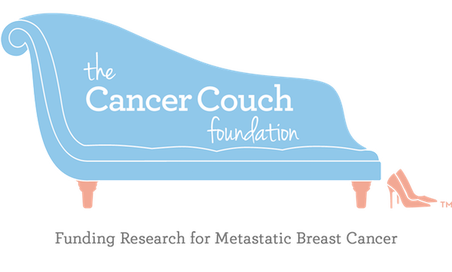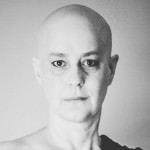|
My name is Beth Calabotta. You may remember me from previous posts that Rebecca has featured about my story and the annual swim challenge held in my honor in Quincy IL – which we have turned into a Cancer Couch Fundraiser. I am writing today, in pretty rough shape, from a hospital bed in Quincy with a very specific message that I would like to get out to as many people as possible: Giving is full of unintended blessings that are often repaid many times over. The past several months have been incredibly challenging for me as I have been in extreme pain, have suffered neurological and physical difficulties due to metastatic disease, treatment side effects, and recently had two seizures. However, one of the main things that helps me keep going and energizes me through these difficult times is my role in the mbc community as an advocate and educator. More recently I have become involved with fundraising as well and have chosen to direct these funds to The Cancer Couch Foundation (TCCF). This is a foundation I believe will continue to do great things for the mbc community so that no one else will have to endure the pain and suffering associated with a terminal diagnosis. I knew that getting involved with TCCF would be empowering to direct money to a place that will make a difference and this takes away some of the feelings of helplessness with cancer. However, my involvement in helping raise funds for TCCF has paid unintended dividends. The other night in the hospital, I was telling the phlebotomist about the swim challenge. I was telling her about the money we raised for research at Dana-Farber Cancer Institute and Memorial Sloan Kettering Cancer Center (who are both matching every dollar donated from TCCF!), and even better – the community donation that TCCF gave to the Blessing foundation in my name to help those mbc patients in my community who are in financial need. I was talking to her about the impact one person can have on changing the future. Rebecca with TCCF, me with trying to help TCCF by raising money, and both of us focused upon helping to change the future so that no one else will have to endure what I have been going through, when I felt myself starting to slur words. I hit my nurse call light which normally produces a response within 5-20 minutes. The phlebotomist then realized I was in trouble and hit the all hands on deck call light and within 30 seconds my room was filled with people to help. A doctor appeared and staff was calling for things to stabilize me, for people to call my family, and in general the nurses were doing whatever they could to help and to reassure me I was in good hands. I had started to panic and was having difficulty breathing, but was able to regain composure because I knew I was in good hands. Moreover, I had witnesses to the entire event, a huge positive to understanding the complete scope of events. The most ironic thing that came out of this was that I was making the point that when you give you often receive more back than you anticipate, and my involvement with the metastatic community has been exactly that. Giving is full of unintended blessings that are often repaid many times over. You do not have to start a foundation or become an advocate to make a difference. There are so many ways to make a huge impact with even small gestures. If you can donate, and have been inspired to do so, please consider doing this in my honor here or on the donate page above (hit the donate pillow). Or, if you are a breast cancer patient yourself – especially a mom or a dad – TCCF is launching a nationwide campaign to get a “Last Day of School Scoops Challenge” to take place in each of the 50 states! The instructions to host one of these can be found here or by hitting the “Fundraise” pillow, and it is so easy. We are specifically looking for people who have been or are breast cancer patients themselves to get this started in your areas as we want you to know this amazing feeling of taking some control over this disease by giving back. The scoops challenge is a fun way to get your kids involved and to help them feel some control over this disease that has impacted them as well. As TCCF did for me, they will donate 10% of all proceeds raised in your community to a fund in your honor. This fund will help mbc patients in financial need at your cancer center. It is an amazing way to give back, contribute to the mbc community, and pay it forward. Please contact Rebecca for more info if you are interested in doing this! Click here to see Susan Rahn’s son Adam’s school in action doing this!
0 Comments
So, as much fun as it was to allow myself a moment of pure indulgence and celebration for the end of a long string of physical hardships and hospitalizations I have had associated with my cancer, my heart remains heavy and I can not fully enjoy these festive feelings knowing that so many of my breast cancer friends will never have a chance to experience relief or respite with this disease. “Don’t Ignore Stage 4” is a popular message that was coined to spread awareness about metastatic breast cancer. Those living with Stage 4 will always be in treatment and do not know how many hospitalizations or surgeries they will have ahead of them. Many times I feel straddled between two worlds of breast cancer – the early stagers (1-3) and those with stage 4 – because there really are huge differences between the two and I have lived in both worlds. Part of the purpose of my blog and foundation has always been to unite everyone while educating people about the differences to increase sensitivity and awareness.
Let me explain: Many people are under the impression that once you go through the typical treatment for breast cancer – whatever that is for each person – a lumpectomy, mastectomy, chemo, and/or radiation – you are done with breast cancer and can go on your merry way. For some people this is true. However, what many people – even those with breast cancer – don’t realize is that 30% of those diagnosed with early stage breast cancer (even Stage 1) will eventually progress to Stage 4 and the cancer will metastasize in another area of their body – even though their breasts have been removed. This can be 6 months, 2, 5, 10, or 20 years after initial diagnosis. Once this happens, the average prognosis remains at just 3 years and you will be in treatment for the rest of your life. Granted, some people have better odds than others based on the type of breast cancer they have and how early it was detected and treated. My cancer was as advanced as it could be without being considered Stage 4 after my biopsy, so my odds will always be higher than the normal “30%” of progressing to Stage 4 – even after pursuing the most aggressive treatments available – the best I will get to is 40%. So, in addition to living with the knowledge that you are only as good as your next scan or bloodwork, and that the cancer could progress at any time, most “early stage” cancer patients stay on some kind of treatment for 5-10 years which has a variety of side effects. I get bone strengthening shots every 6 months and take hormone therapy meds daily. My side effects include severe joint pain, insomnia, and hot flashes to name just a few. I am therefore always a bit puzzled when someone refers to my cancer as if it were like a flu that is now behind me. I plan to move forward living as healthy a lifestyle as I possibly can now that I hopefully won’t be in the hospital every month for one surgery or another – and I will find a way to integrate the cancer diagnosis and side effects into my life, but I certainly do not see it as something that is behind me. Although I am graciously aware that there is a chance it will not come back, and that I may at some point be done with treatment for this disease – that is a distinct possibility for me – perhaps in 10 years if I’m lucky. I am also painfully aware of the reality of what happens if it does come back. That brings me to my Stage 4 friends – many of whom were early stage cancer patients at one point. They will never, ever be done with treatment. Even if they currently have No Evidence of Disease (NED) – they are always undergoing treatment and getting regular bloodwork and anxiety provoking scans. Those with a heavy disease burden face every holiday with their families not knowing if it is their last, and every hospital admission not knowing if they will ever return home. I am intimately connected to many people at all stages of this disease but mostly those in the metastatic breast cancer community, and my heart breaks everyday hearing about another amazing person we’ve lost, or another friend suffering from debilitating side effects of their treatment. I present all this info not to be macabre, but rather to keep people informed about the reality of breast cancer both for me and for those living with Stage 4 -for whom The Cancer Couch is fighting. Please remember these realties as you make choices of where to donate at the end of this year and for the holiday season. We can send someone a lovely card acknowledging a donation you may like to make in someone’s honor or memory, and we have lovely gifts in our shop that make nice presents as well. Please remember those living with stage 4 this holiday season with prayers, support and spreading awareness. As happy as I am to be home with my family this holiday season, my heart is heavy with the knowledge of all this suffering and I will continue my work with the Cancer Couch to eradicate this disease as soon as I’m able. Please help me and encourage others to do the same. Thank you! Judith Kelman is… On The Couch For those of you who read and enjoy my blog and my writing, you can thank this amazing woman for encouraging me and providing a forum and outlet for my work, and for those who don’t, you can go ahead and blame her too! I am so happy to introduce Judith Kelman, the founder of Visible Ink – a free writing program for cancer patients at Memorial Sloan Kettering Cancer Center (MSKCC). Judith is an accomplished, published author, and her husband is a physician at MSKCC. Very quickly after I was diagnosed, in fact while I was still grappling with the Stage 4 diagnosis, I was desperately looking for an outlet to process and share what I was going through. For me, writing was a natural and incredibly healing way to express myself and put a narrative to the psychological and physical trauma of my cancer and complications. From my laptop on my good ol’ cancer couch, I came across this program that was free to patients at MSKCC – well “free” for the small price of having cancer – and immediately called Judith to enroll. She was so kind and encouraging and completely “got” why this was so needed and helpful for people dealing with a cancer diagnosis. For me, this was as vital as anything else I was doing to treat my illness. I was fascinated and so impressed to learn that she started this venture herself, one person, after having this brilliant idea – and it has blossomed into such an amazing program. I realized, that is pretty much exactly how anything starts – with one person, one idea, and a ton of passion, commitment and energy. So without further adieu, I’m so pleased to introduce Judith Kelman: “My inspiration for Visible Ink was the death of an 18-year-old friend when I was 17. Throughout his terrible illness, no one would utter the word “cancer,” and it went without saying that no one was to speak of death. The silence and stigma surrounding the tragic early loss of this wonderful young soul stuck with me. Visible Ink is open to all Memorial Sloan Kettering patients, regardless of writing level. Participants may write about anything they like, in any form. The writing need not be about the experience of illness. This program pairs each participant with an experienced writing mentor. It also uses assistive technology to facilitate expression in participants with cognitive or physical limitations due to cancer or its treatments. Visible Ink is free of charge to participants, supported solely by grants and donations. In just 6 years, this incredible program has grown to include over 1400 participants enrolled to date, ages 7 to 95 plus, from all over the world. There are over 200 mentors, including Emmy Award-winning TV writers (e.g., Bill Persky), Tony Award-winning playwrights, bestselling novelists, world class journalists and poets. Over 60,000 pages of written work (poems, essays, journals, blogs, stage plays, screenplays, photoessays, comedy sketches, fiction, articles, legacy pieces, lyrics, and letters) have come out of this program to date. Visible Ink has received media coverage by CBS, Fox News, WPIX, NY1, Heritage Radio Network, Voice of America, Citizen Magazine, Cure Magazine, Cancer Today, and many other print and online media. Studies have been published in the Journal of Palliative and Supportive Care and there is ongoing research about the impact of writing through illness with the Department of Psychiatry. Visible Ink publishes an annual anthology, in which I was honored to be featured last year, and they produce a performance of select works by participants at their Spring showcase. Being a part of this program has been so helpful to me in creating a structure for my writing and providing a wonderful editor, Heather Laing, that helps whenever I need her. It has given me encouragement and validation and allowed me to feel a part of something. I am so grateful to have had this outlet during this really difficult time. As Kim DeYoung explores in her podcast – The Alchemy of Choice – the power and choices of one person, and the ripple effect it has can be exponentially life-changing and powerful! This foundation, which I believe is truly helping to change the landscape and narrative of breast cancer and research to include and focus on metastatic breast cancer, and which I also believe will contribute substantially to bringing an end to this illness and ultimately save not only the 40,000 lives a year that are now taken from metastatic breast cancer in the US alone, but 40,000 x however many years humans are in existence after this is cured – is the result of one choice this one little person made with the help of all of you amazing people. I challenge all of us, as we prepare to head into a new year, to think of Judith the next time you have a great idea that can help others and add something positive to this world. One person, with one idea, who makes one choice to change something in the world that they feel passionate about, can make a permanent and lasting change in the lives of so many others. Remember The Power Of One.
|
Stage 4 AwarenessArchives
January 2017
Categories |
The Cancer Couch Foundation
|
The Cancer Couch Foundation PO Box 1145, Southport, CT 06890
[email protected] Employer Identification Number: 81-1529788 |
Disclaimer: Please note, the opinions and advice provided here are not meant to replace the guidance of your personal health care team, with whom you should always consult before making significant diet, exercise, or lifestyle changes, or for any individual medical or mental health concerns.






 RSS Feed
RSS Feed